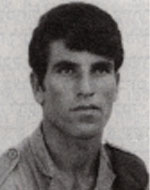Fadida, Abraham
Avraham, son of Kuta and Nissim, was born on November 4, 1950, in Pardes Hannah. He studied at the Hadar Ramatayim elementary school in the Sharon and spent one year in a mechanical course at the vocational school in Holon. A bright and alert child was Abraham, who was called by his family and friends as “Berto”. Hadar Ramatim’s boarding school has revealed his joy of life and his curiosity to know and learn the ways of the world has also been evident. After graduating from elementary school, he went to a vocational school and studied car mechanics. After leaving school, he did not sit idle and began to work in various construction projects. Avraham was a craftsman by profession, and was very successful in his work. He acquired the trust of the foremen and was known as a dedicated and responsible builder. Shortly before his recruitment, he was appointed as a subcontractor in one of the workplaces. Avraham was an active boy since his childhood, a sports fan and a soccer player in the Ramat Hashikma group of Ramat Gan. “The body of an excellent athlete was for Berto, and it was no accident that he took part in all the sports and also succeeded, he had skills and ability, and he was very successful,” said the Fadida family. When Barto was a young boy, he collected stamps from all over the world. He later began painting, and also taught his friends a chapter in art. In the home of the parents are paintings made by Abraham. His father says that Barto was deeply influenced by the classical painting, and liked to look at albums and art books. “Berto’s inclination to painting expanded over the years, and on the eve of his enlistment he was an amateur architect, who built sports facilities and devoted maximum attention not only to their efficiency, but also to their aesthetic form.” A friendly boy was Berto, and according to his friends: “Of all the qualities blessed by them, one was conspicuous: the manner of keeping promises he made, because Barto never promised anything and later refused to carry it out. His brothers and sisters are very grateful for Barto. They mark the wisdom of life and its sense of justice. “Berto was very self-confident,” said his sister Esther. According to her, her brother was the dominant figure in the house. “He was a devoted son, loved us all, and did his best for our happiness.” Avraham was drafted into the Israel Defense Forces in mid-November 1970 and assigned to the infantry corps, where he completed a training course in paratroopers, and proudly wore paratroopers’ wings. “His sister Ester, who proudly and joyfully noted her brother’s achievements, was satisfied with his life in the army, modest and did not boast of his achievements, and he made sure to write to his parents and when he was at home on short vacations, he requested To hear about everything that had taken place in the house in his absence, and was to be released from the army in mid-November 1973. He planned much in the bear Continue through life. No one imagined that the sturdy, solid, handsome boy would not realize his plans. When the Yom Kippur War broke out, Barto hurried to his unit in the infantry. He was sent to the Sinai front and acted as a NCO machine gunner in one of the IDF’s largest bases in Sinai. On October 8, 1973 Avraham was hit and killed in an air strike. He was laid to rest in the military cemetery in Kiryat Shaul. Survived by his parents, three sisters and two brothers. After his fall, he was promoted to First Sergeant. In a letter of condolence to the bereaved family, then-Defense Minister Moshe Dayan wrote: “Avraham served in the infantry. He was a devoted soldier and a loyal friend. Avraham was loved by everyone who knew him. “The Fadida family donated a Torah scroll to the” Don Yitzchak Abarbanel “Synagogue in Ramat Gan.
